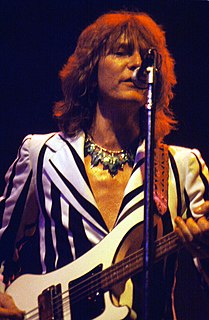Top 83 Quotes & Sayings by Chris Squire
Explore popular quotes and sayings by a British musician Chris Squire.
Last updated on April 14, 2025.
I think partly the problem with Yes - and I've had this discussion with people from the Hall of Fame in the past - is that it's going to be difficult to decide how many of the members of Yes you're gonna put in it and how many you're not because of the extensive membership of the band through the years.
I think the first three Rickenbacker basses were imported around 1964. Pete Quaife, the bassist for The Kinks, bought one. Then John Entwistle from The Who bought one. As for the third one, I asked the manager of the store if I could get an employee discount. He said I could, and so I picked up that one.




















